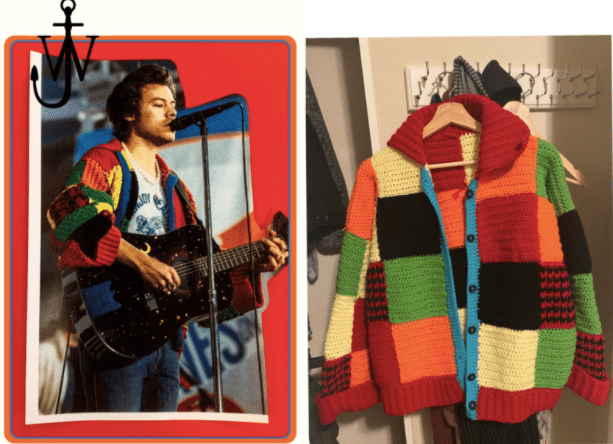Every summer for the past few years, I have been a proud member of the knit and crochet club at my local library. We would have meetings every Friday afternoon to work on projects and show each other what we are doing. It was always the highlight of my week. After quarantine started, though, the library closed and the meetings stopped. I haven’t had much of an excuse to knit or crochet in the past few months — that is, until I found a sweater that had taken over as a “quarantine craft” on social media.
In a live concert at the Today Show, Harry Styles performed wearing a color blocked cardigan that sparked a TikTok trend of knitting, looming and crocheting lookalikes. As a Harry Styles fan, avid crocheter, and lover of cardigans, I simply had to join in. The trend had become so popular that the company that created the sweater, JW Anderson, released a knitting pattern that would produce a similar enough cardigan.
I gathered my materials, downloaded the pattern and got to work. What follows are accounts of the more exciting days that I worked on my sweater.
Day 1:
I took one look at the knitting pattern and immediately decided I wasn’t going to follow it. It wasn’t that the pattern was unhelpful, but it required far too many complex knitting stitches, which I had no idea how to replicate. I decided instead to switch from knitting to crocheting, and to only use the JW Anderson pattern as an assembly guide. By the end of the day I realized I was severely underprepared — I was quickly running out of yarn, and I had only managed to make six of the 72 squares that made up the sweater, which was incredibly demoralizing.
Day 4:
This was one of the more “dangerous” days in creating the sweater. By this time, I had completed all of the pieces necessary for the front of the sweater and had begun to sew them together. Once the front was assembled, I realized that I didn’t need all 72 squares to assemble the sweater — it was far too big as it was. I had to make a very important decision that day: whether I would continue to follow the pattern or modify the dimensions so that it would fit. After hours of indecision, I decided to modify the pattern, a decision I wouldn’t be sure about until the sweater was actually finished.
Days 10 – 12:
These days, I didn’t get any work done. The squares were calling out to me, begging me to sew them into the body of the sweater, but I ignored them in favor of procrastination. My fingers were sore and tired from all the work I had done in the days before. These days were a well-deserved break for me.
Day 14:
The final day of work on the sweater I had grown to love and hate, but mostly hate by that point, was bittersweet. What would I do after the sweater was done? Making the sweater had become my entire life, and I was sad to part with it. I was also glad that I had accomplished such a large undertaking.
Looking back on the project, I found that I was far too optimistic in the beginning. I left little notes to myself earlier on describing how many squares or pieces I would finish that day, and I rarely met my quotas. By the end, my notes simply said “just finish one square, please, I’m begging you.” In spite of this, I was able to finish. I thought it was going to be easier than it was because I was used to making stuffed animals, beanies and other small projects at the knit and crochet club. I don’t think I fully understood how big the sweater was and how much work was required to recreate it. The process of creating the sweater may have been slightly demoralizing, but when I finally got to wear the finished cardigan, I was incredibly proud of myself. And though I would never do something like this again, it was an experience that I will never forget.
Contact Prithi Srinivasan at 22psrinivasan ‘at’ pinewood.edu.
